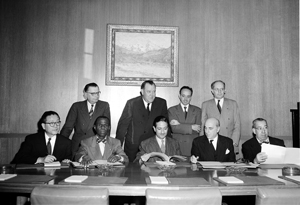Preventing Genocide

Ratification of Genocide Convention, October 1950
(UN Photo/MB)
The 1948 Convention on the Prevention and Punishment of the Crime of Genocide (article 2) defines genocide as "any of the following acts committed with intent to destroy, in whole or in part, a national, ethnical, racial or religious group … ", including:
- Killing members of the group;
- Causing serious bodily or mental harm to members of the group;
- Deliberately inflicting on the group conditions of life calculated to bring about its physical destruction in whole or in part;
- Imposing measures intended to prevent births within the group;
- Forcibly transferring children of the group to another group.
The Convention confirms that genocide, whether committed in time of peace or war, is a crime under international law which parties to the Convention undertake “to prevent and to punish” (article 1). The primary responsibility to prevent and stop genocide lies with the State in which this crime takes place.
To prevent genocide and genocidal conflicts, it is critically important to understand their root causes. While conflict has many causes, genocidal conflict is identity-based. Genocide and related atrocities tend to occur in societies with diverse national, racial, ethnic or religious groups that are locked in identity-related conflicts. It is not simply differences in identity, whether real or perceived, that generate conflict, but the implication of those differences in terms of access to power and wealth, services and resources, employment, development opportunities, citizenship and the enjoyment of fundamental rights and freedoms. These conflicts are fomented by discrimination, hate speech inciting violence and other violations of human rights. In terms of prevention, the critical step is to identify the factors (discriminatory practices) in a given situation that lead to/account for acute disparities in the administration of a diverse population, and to seek ways to diminish and eventually eradicate these possible causes of genocidal violence. Given that no country is perfectly homogeneous, genocide is a truly global challenge.
Never Again: An Interview with Adama Dieng, Special Adviser on the Prevention of Genocide
Published on April 16, 2014
An audio-visual slideshow of Adama Dieng, Special Adviser on the Prevention of Genocide discussing the Rwandan Genocide, and what we can do to try and stop similar events from happening worldwide.
